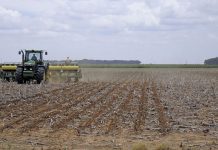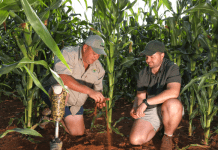Wool prices declined for a second week in a row on the back of uncertainty caused by the turmoil in global financial markets and the Merino indicator ended 5,1% softer at R49,18/kg (clean), according to Ona Viljoen of Cape Wools. “was the first time since December 2006 that the indicator fell to below the key R50/kg level,” she explained. “Although the average indicator for the season to date is 14% down year-on-year, it is still 10% higher than the average indicator for the 2007/08 season.” Buyers reported a sharp decline in orders since clients are reluctant to buy in the current economic climate and unstable currencies.
In Australia, the market indicator fell 2,2%. The rand was fairly stable during the morning, trading at R9,15 to the US dollar at mid-morning. At R12,47, it was largely unchanged against the euro compared to the previous Wednesday’s exchange rate. Viljoen said prices were lower across the board. In the long Merino wool category, the broader end of the market, particularly 22 micron and 23 micron, was the most affected, declining by over 6%. Johan Louw of Cape Mohair & Wool (CMW) said buyers only bid on wool destined for specific orders, but competition, especially among the finer offerings, was good with Modiano competing actively.
The highest price achieved by a CMW client was R63,45 for six bales of AMY of 17,2 micron sold by Brandwater Boerdery from Fouriesburg to Segard Masurel. Louw believes the limited supply should soften the downside in the short term. “Although mills are running at a reduced capacity, there is still a commitment to honour outstanding orders and keep machines running,” explained Louw. he offering comprised 6 171 bales of which 86% was sold.
Major buyers were Modiano (1 216 bales), Standard Wool South Africa (1 016 bales), Stucken (973 bales) and Chargeurs (784 bales). verage price movements for AWEX-type fleeces MF4 and MF5 of 70mm and 80mm were as follows: 19 micron was down 1,9% to R65,49/kg; 20 micron fell 4,9% to R53,80/kg; 21 micron was 4,5% softer at R50,14/kg; 22 micron declined by 6,3% to R48,03/kg; and 23 micron was 6,6% cheaper at R46,24/kg. – Roelof Bezuidenhout








